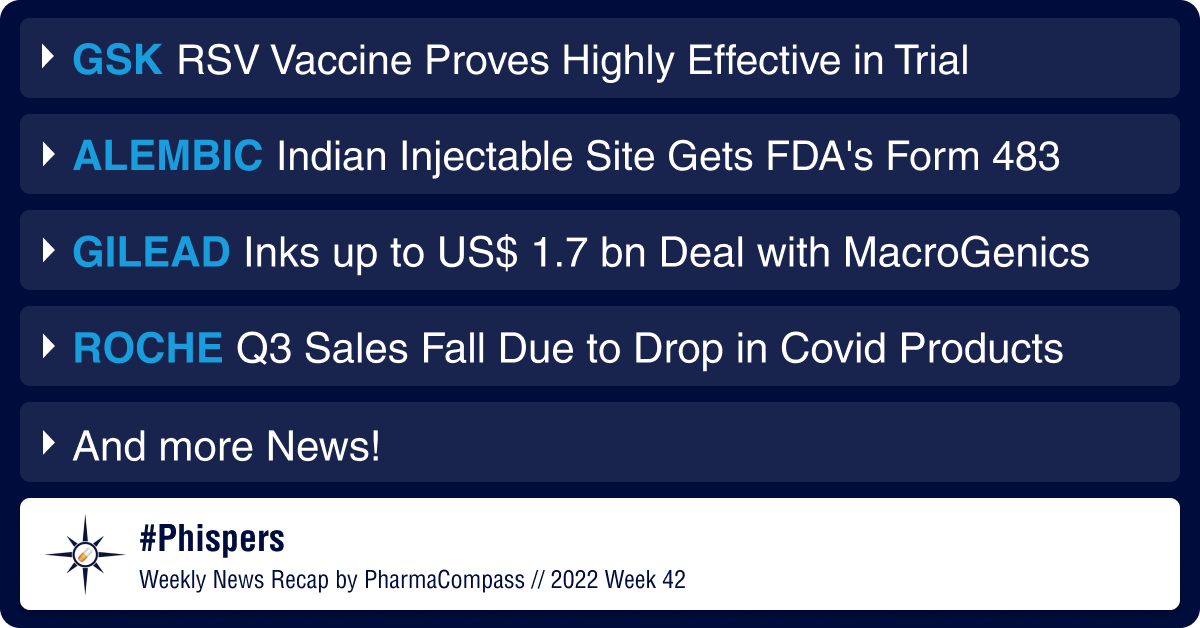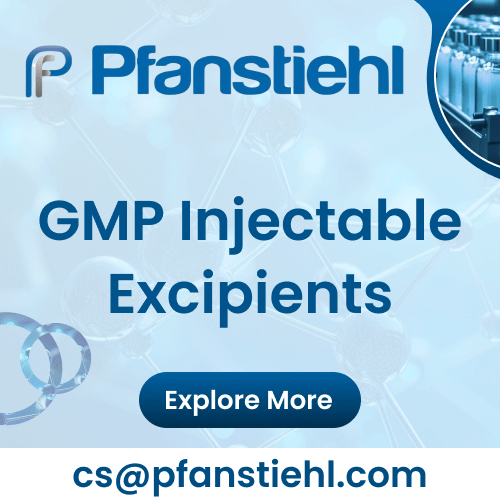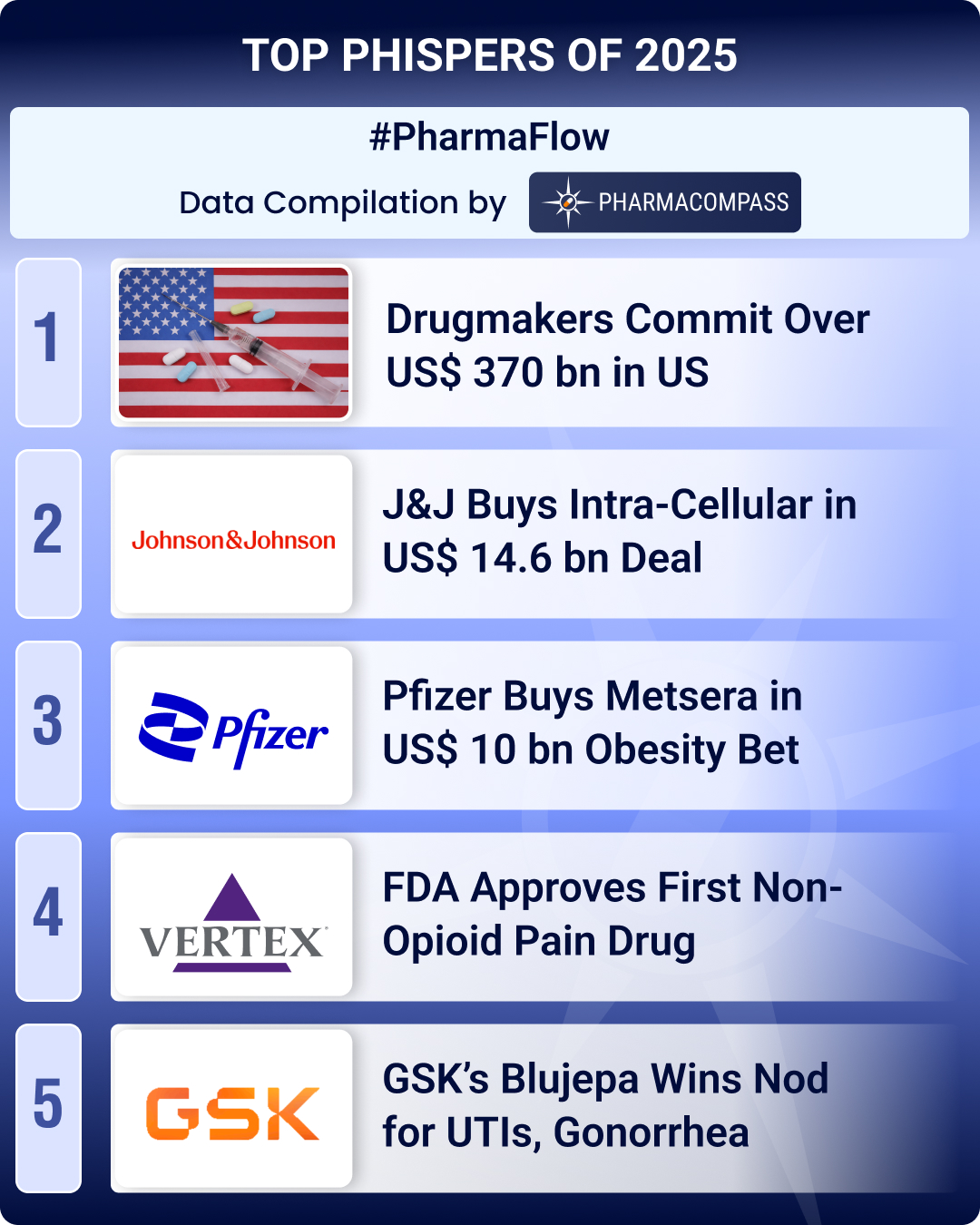
By PharmaCompass
2022-10-20
Impressions: 1,338 Article
The race to bring the first respiratory syncytial virus (RSV) vaccine to the market is fast heating up. Months after Pfizer said its experimental drug candidate has achieved a vaccine efficacy rate of 66.7 percent, GSK said its RSV shot reduces lower respiratory infections by 83 percent.
In regulatory news, the US Food and Drug Administration (FDA) has issued a Form 483 with four procedural observations to Alembic Pharmaceuticals’ oncology injectable formulation facility at Panelav in the Indian state of Gujarat. The FDA has extended the review of Biogen’s amyotrophic lateral sclerosis (ALS) drug — tofersen — by three months. Biogen had secured a priority review status from the FDA in July.
An FDA panel has recommended withdrawing Covis Pharma’s Makena from the US market, after a larger study failed to show that it was effective in preventing preterm birth. The US Supreme Court has turned down Novartis’ bid to block the launch of generic versions of its blockbuster multiple sclerosis drug Gilenya.
In recalls, Exela Pharma Sciences said it is voluntarily recalling 49 lots of its sodium bicarbonate 8.4 percent injection from the US market following safety concerns of vial breakage and flying glass. And Roche is voluntarily recalling its eye therapy Susvimo, an implant for wet age-related macular degeneration (AMD), due to manufacturing problems with the device.
In approvals, a committee of the European Medicines Agency (EMA) has recommended the authorization of Atara Biotherapeutics and Pierre Fabre’s Ebvallo (tabelecleucel) for the treatment of Epstein-Barr virus-positive, post-transplant lymphoproliferative disease (PTLD) in patients two years or older. The FDA has approved a single vial, ready-to-use version of GSK’s meningococcal disease vaccine Menveo in people between the ages of 10-55 years.
Gilead Sciences has signed a potential US$ 1.7 billion biobucks deal with Maryland-based biotech MacroGenics to develop blood cancer drug candidates. South Korean drugmaker LG Chem is acquiring Aveo Oncology for US$ 566 million in cash. And Eli Lilly has scooped up Boston-based genetic medicine developer Akouos for about US$ 487 million in cash to discover and develop treatments for hearing loss.
Roche’s sales in the third quarter (Q3) this year fell 6 percent due to a drastic drop in Covid-19 treatments and diagnostic testing. And, after The Gambia, Indonesia has linked the deaths of 99 children to drug syrups contaminated with “unacceptable” levels of diethylene glycol and ethylene glycol.
After Pfizer’s shot, GSK’s RSV vaccine proves highly effective in late-stage trial
The race to introduce the first respiratory syncytial virus (RSV) vaccine in the market is fast heating up. In August, Pfizer had said its experimental drug candidate has achieved a vaccine efficacy of 66.7 percent against RSV-associated lower respiratory tract illness with two or more symptoms.
Now, GSK has announced results from a large phase 3 trial, where its RSV vaccine candidate has proven to be highly effective, reducing cases of lower respiratory infection by 83 percent in people 60 years and older. In trial patients with pre-existing conditions, the vaccine recorded an even higher efficacy of around 94.6 percent. And in adults between 70-79 years of age, the drug was 93.8 percent effective. Analysts, however, said given the different definitions of the trial endpoints between the GSK and Pfizer trials, a direct comparison of efficacy is difficult
FDA nod to GSK’s single vial meningococcal disease jab: FDA has approved a single vial, ready-to-use version of GSK’s meningococcal disease vaccine — Menveo — in people between the ages of 10 to 55 years. GSK’s original two-vial version of the vaccine, approved for use in children as young as two months, needs to be reconstituted in a three-step process before being administered. GSK said the FDA nod removes the need for reconstitution of Menveo before use.
Alembic’s injectable facility in Gujarat receives Form 483 with four observations
FDA has issued a Form 483 with four procedural observations to Alembic Pharmaceuticals’ oncology injectable formulation facility at Panelav in the Indian state of Gujarat. The agency had carried out an inspection of the facility between October 4 and 14.
The pharma said the observations are addressable, and none pertain to data integrity. Alembic is preparing its response to the observations, which will be submitted to the FDA within the stipulated period.
This is the second Form 483 for the drugmaker in recent times. In August, the FDA had inspected Alembic’s injectable facility at Karkhadi in Gujarat and issued a Form 483 with two observations. The agency had flagged quality and procedural lapses at the facility following its inspection.
US Supreme Court turns down Novartis’ plea to block generic versions of Gilenya
The US Supreme Court has turned down Novartis’ bid to block the launch of generic versions of its blockbuster multiple sclerosis (MS) drug Gilenya in a dispute with private Chinese biotech HEC Pharm. A spokesperson for Novartis said the company will “continue to vigorously defend the validity of the Gilenya patent.”
The Swiss pharma had approached the top court requesting it to suspend a lower court’s ruling lifting a ban on generic versions of Gilenya. The drug is Novartis’ third highest-selling drug that generated US$ 2.8 billion in sales last year.
HEC had filed for approval of its Gilenya copycat in 2016 and had won approval in 2019. Novartis had slapped a handful of lawsuits on HEC asserting various Gilenya patents, which expire in 2027.
Novartis to cut 400 jobs in Ireland: Novartis said it will cut up to 400 jobs, or about a quarter of its workforce in Ireland, by the end of 2024. The Swiss pharma currently employs 1,500 people in Ireland, including 1,000 at its Dublin campus. The cuts are part of a major restructuring that the company had announced earlier this year. As part of the restructuring, the Swiss Pharma had said it will cut as many as 8,000 of its 108,000 staff.
Fear of vial breakage prompts Exela to recall 49 lots of its metabolic acidosis shot
Exela Pharma Sciences said it is voluntarily recalling 49 lots of its sodium bicarbonate 8.4 percent injection from the US market following safety concerns of “vial breakage and flying glass.”
Exela has received five reports of flying glass that resulted in injuries to the skin, eye and other body parts, but there have been no reports of sterility failures. The medicine, sold under both the Exela and Civica brands, is used to treat metabolic acidosis (or the build-up of acid in the body due to kidney disease or failure).
EMA panel backs Atara’s Ebvallo to treat organ transplant complications
A committee of the EMA has recommended the approval of Atara Biotherapeutics and Pierre Fabre’s Ebvallo (tabelecleucel) for the treatment of Epstein-Barr virus-positive, post-transplant lymphoproliferative disease (PTLD) in patients two years or older. The patients should have received at least one prior therapy, mostly chemotherapy, for solid organ transplant patients.
PTLD is a life-threatening complication following solid organ or bone marrow transplantation. Atara said the positive opinion is backed by data from a phase 3 trial where the T-cell therapy demonstrated a favorable risk-benefit profile. If approved, Ebvallo will become the first allogeneic T-cell therapy anywhere in the world.
FDA extends Biogen’s ALS drug review; decision to come in April 2023
Back in July, Biogen had secured a priority review status from the FDA for its drug tofersen, meant to treat a rare type of amyotrophic lateral sclerosis (ALS). FDA’s decision was expected by January 25, 2023. Now, the FDA has extended the review of the treatment by three months, terming the additional information submitted by Biogen as a major amendment. The agency said it will take the additional time to review the data. It has set the new target action date as April 25, 2023. If approved, tofersen will be the first treatment to target a genetic cause of ALS.
Sage-Biogen’s drug meets goal in late-stage postpartum depression study: Sage Therapeutics and partner Biogen said their experimental antidepressant drug — zuranolone — met its primary and key secondary endpoints in a phase 3 study of women with postpartum depression (PPD). Women treated with the oral pill experienced significantly improved depressive symptoms after 15 days, compared to those on placebo. The effect of the treatment was sustained through four and six weeks.
Gilead signs potential US$ 1.7 billion oncology deal with MacroGenics
Gilead Sciences has signed a potential US$ 1.7 billion biobucks deal with Maryland-based biotech MacroGenics to develop blood cancer drug candidates. The deal will give Gilead the license to MacroGenics’ candidate, MGD024, which is being developed for blood cancers, including acute myeloid leukemia (AML) and myelodysplastic syndromes (MDS). The California-based pharma will also get access to two more bispecific research programs as part of the deal.
LG Chem acquires Aveo Oncology for US$ 566 million: South Korean drugmaker LG Chem is acquiring Aveo Oncology for US$ 566 million in cash, helping it gain a foothold in the US anti-cancer drug market. LG Chem will gain access to Aveo’s kidney cancer drug Fotivda, which has received an FDA approval for third-line treatment of relapsed or refractory advanced renal cell carcinoma. In addition, Aveo has three other cancer candidates.
Lilly buys Akouos for US$ 487 million in cash: Eli Lilly will acquire Boston-based genetic medicine developer Akouos for about US$ 487 million in cash to discover and develop treatments for hearing loss. The deal will give Lilly access to Akouos’ lead candidate, AK-OTOF, which is a gene therapy being developed for the treatment of hearing loss due to mutations in the OTOF gene.
Jazz buys rights to Zymeworks’ cancer drug: Jazz Pharmaceuticals is paying Canadian biotech Zymeworks US$ 50 million upfront for exclusive development and commercialization rights of zanidatamab, a HER2-directed bispecific antibody that is in phase 3 trials for biliary tract cancer and gastroesophageal adenocarcinomas. If Jazz decides to continue the partnership, it will pay another US$ 325 million along with certain regulatory and commercial milestone payments, bringing the total value of the deal to up to US$ 1.76 billion.
Roche’s Q3 sales decline due to drastic drop in Covid treatments, testing
Roche’s sales in the third quarter (Q3) fell 6 percent due to a drastic drop in Covid-19 treatments and diagnostic testing. The Swiss pharma’s Q3 revenue fell to 14.74 billion Swiss francs (US$ 14.84 billion), below market expectations of about 15.5 billion francs (US$ 15.6 billion). Sales from Regeneron-partnered Covid-19 antibody Ronapreve and anti-inflammation med Actemra declined by around 1 billion Swiss francs (US$ 1 billion) year-on-year in the first nine months. And about 900 million Swiss francs (US$ 906 million) of this drop happened in the third quarter.
Withdraws eye therapy due to leakage fears: Roche has voluntarily recalled its eye therapy Susvimo – an implant for wet age-related macular degeneration (AMD) that dispenses a formulation of ranibizumab – due to manufacturing problems with the device. Meanwhile, Roche said it is scrapping two of its phase 2 programs, one for hepatitis B and the other for geographic atrophy, a form of eye disease.
FDA panel recommends withdrawing preterm birth injection from market
An FDA advisory committee has recommended withdrawing Covis Pharma’s Makena from the market, after a larger study failed to show that it was effective at preventing preterm birth. It’s now up to the FDA to make a final decision about removing the drug from the market.
A panel of 16 independent experts reviewed whether to recommend Makena, an injection marketed as lowering the risk of preterm birth in people who have previously gone into early labor. Makena was approved in 2011 on a conditional basis. The panel’s vote was widely viewed as a test of the agency’s “accelerated approval” program, which has expedited nearly 300 promising drugs to the market in 30 years.
FDA’s real world evidence program: The FDA has said it will start accepting applications for its new Advancing Real-World Evidence (RWE) Program, negotiated under the Prescription Drug User Fee Act (PDUFA VII). The goal of this program is to “improve the quality and acceptability of RWE-based approaches in support of new intended labeling claims, including approval of new indications of approved medical products or to satisfy post-approval study requirements.”
After Gambia, Indonesia links deaths of 99 children to contaminated syrups
Recently, there was news from The Gambia that cough and cold syrups containing “unacceptable” levels of diethylene glycol and ethylene glycol may have caused the deaths of 66 children from acute kidney injuries. Since then, the number of child deaths has reportedly risen to 70.
Now, Indonesia’s health minister has said some medicinal syrups available in the country have been linked to fatal acute kidney injury in children. The health ministry has launched a probe into the deaths of 99 children that took place this year and has temporarily banned sales of all syrup-based medications and is looking into paracetamol syrups that contain diethylene glycol and ethylene glycol. While the deaths of Gambian children have been linked to syrups manufactured by India-based Maiden Pharma, Indonesia’s food and drug agency has clarified that Maiden’s syrups were not available in the country.The PharmaCompass Newsletter – Sign Up, Stay Ahead
Feedback, help us to improve. Click here
Image Credit : Phisper Infographic by SCORR MARKETING & PharmaCompass license under CC BY 2.0
“ The article is based on the information available in public and which the author believes to be true. The author is not disseminating any information, which the author believes or knows, is confidential or in conflict with the privacy of any person. The views expressed or information supplied through this article is mere opinion and observation of the author. The author does not intend to defame, insult or, cause loss or damage to anyone, in any manner, through this article.”







